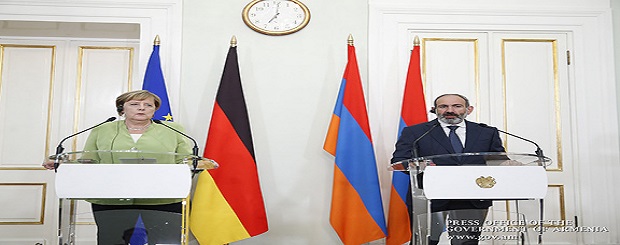
24 AUGUST 2018 – INTERNATIONAL POLICY:
YEREVAN—German Chancellor Angela Merkel, who is on an official visit to Armenia, pledged her country’s support for a peace resolution to the Karabakh conflict and hailed Armenia’s relations with Germany and European Union.
Merkel arrived in Armenia on Friday and was met at Zvartnots International Airport by Prime Minister Nikol Pashinyan, President Armen Sarkissian and other government officials. From the airport, Merkel, joined by Foreign Minister Zohrab Mnatsakanyan, visited the Dzidzernagapert Armenian Genocide Memorial Complex, where she laid a wreath in memory of the victims of the Genocide and after signing the memory book, planted a tree in the memorial garden.
Before holding talks separately with Pashinyan and Sarkissian, Merkel visited the Tumo Center for Creative Technologies. After the official meeting, Merkel was joined by the president, prime minister, his wife, Anna Hakopyan for a stroll on Yerevan’s Northern Avenue.
But it was Merkel’s high praise for German, EU, Armenia relations, as well as Armenia’s balancing act between Russia and the West that was the highlight of the bi-lateral talks. This, coupled with Merkel’s pledge to ensure a peaceful resolution to the Nagorno-Karabakh by leveraging Germany’s membership in the OSCE Minsk Group the created optimism.
Merkel said Armenia can become an example of how a country can cooperate with Russia, while at the same time, advance and develop relations with the European Union.

German Chancellor Angela Merkel lays flowers at the Dzidzernagapert Armenian Genocide Memorial
“Armenia can be an example of how it’s possible to cooperate with Russia and, at the same time, have good relations with the European Union,” said Merkel during a joint press conference with Pashinyan after the two leaders concluded their meeting.
Commenting about Armenia’s membership in the Russian-led Eurasian Economic Union, Merkel said that Armenia could become bridge for beneficial economic relations between the EEU and the EU.
Pashinyan emphasized the importance if the EEU for Armenia, but also said that during the discussion with the German leader they explored possibilities of trade utilizing the EU’s preferential trade system, known as theGSP+, to advances relations between the EEU and the EU.
Pashinyan called his talks with Merkel “very productive” and said that the position of the sides on many issues were similar, which indicates that the potential to develop and expand Germany-Armenia relations was high.
“We hope that the level of our cooperation will significantly change. We discussed and reached an agreement that after this visit we will develop a joint agenda for different spheres and will work toward their implementation,” said Pashinyan at the press conference.
Merkel also praised the Compressive and Enhanced Partnership Agreement between Armenia and the EU and pledged her country’s active involvement in realizing the provisions of the agreement, which was signed last fall and has been viewed as a new opportunity for Armenia to expand economic and civic relations with the West.

German Chancellor Angela Merkel meets with Armenia’s President Armen Sarkissian
The two leaders also touched on domestic issues with Merkel pointing out that her government and the German people closely followed the events of last spring, which culminated in the Velvet Revolution. She said she was encouraged by the steps the Armenian government was taking with its anti-corruption effort.
Reportedly, during their closed-door meeting, Pashinyan, once again, urged the EU to reward Armenia’s efforts on reform and fighting corruption by increasing financial support. While Merkel praised Armenia’s willingness to tackle those issues, she did not publicly pledge increased financial assistance to Armenia.
Merkel also reported that the two leaders discussed a visa-free regime between the EU and Armenia, but cited the large number of Armenians seeking asylum in Germany as an obstacle for advancing that issue, which has been on the EU-Armenia agenda for more than a decade.
Pashinyan was quick to point out during the press conference that the changes in Armenia were setting the ground for repatriation by Armenian, announcing that since the Velvet Revolution the number of Armenians arriving in Armenia was far greater than those leaving the country.
Merkel, who is scheduled to visit Azerbaijan Saturday, said that she planned to discuss with Azerbaijani President Ilham Aliyev, effort to reach a peaceful resolution to the Karabakh conflict. She also added that she plans to also address Baku’s decision to refuse an entry visa to a member of her delegation, German Parliament member, Albert Weiler, who has been blacklisted by Azerbaijan because of his travels to Artsakh.
Meeting with President Sarkissian
Merkel and Sarkisian held a meeting at the Presidential Palace and discussed ways to advance and improve relations between the two countries.
“I want to note with satisfaction that the Armenian-German relations are based on mutual understanding and deep trust. Germany is a very important partner for Armenia, but there is much room for expanding our cooperation in different spheres. And of course, I want to express my satisfaction for the recognition of the Armenian Genocide by Germany and also for the political support that we feel in our cooperation with the EU, since the Armenian-EU relations are very important for us,” said President Sarkissian.

A toast during the state dinner in honor of German Chancellor Angela Merkel
“Last year our countries marked the 25th anniversary of the establishment of diplomatic relations, and today we can summarize our relations as positive. I agree with you that we have unutilized potential in our relations and it should be used not only in political or economic spheres, but also in research and technological spheres. We wish to make our contribution to the reforms declared by Armenia and we attentively followed the changes and processes that took place in your country in spring. We are ready to cooperate in this difficult but important moment,” Merkel told Sarkissian.
On Friday evening, Pashinyan hosted a state dinner in honor of Merkel.
asbarez.com/174545
